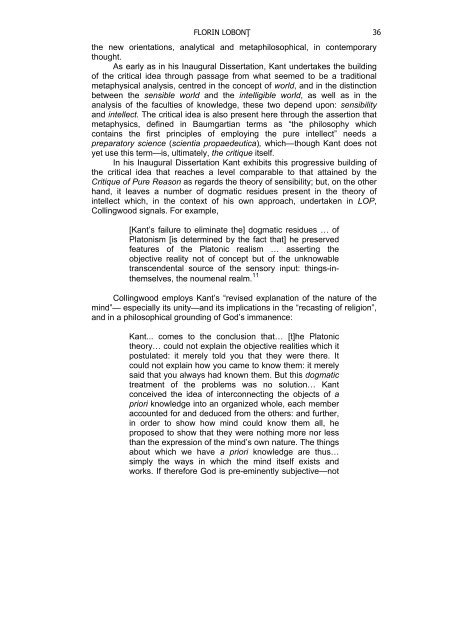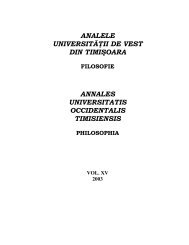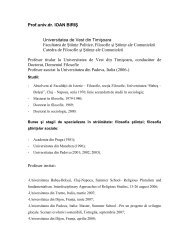VOL. IV (XXI) 2009 - Departamentul de Filosofie si Stiinte ale ...
VOL. IV (XXI) 2009 - Departamentul de Filosofie si Stiinte ale ...
VOL. IV (XXI) 2009 - Departamentul de Filosofie si Stiinte ale ...
Create successful ePaper yourself
Turn your PDF publications into a flip-book with our unique Google optimized e-Paper software.
FLORIN LOBONŢ 36<br />
the new orientations, analytical and metaphilosophical, in contemporary<br />
thought.<br />
As early as in his Inaugural Dissertation, Kant un<strong>de</strong>rtakes the building<br />
of the critical i<strong>de</strong>a through passage from what seemed to be a traditional<br />
metaphy<strong>si</strong>cal analy<strong>si</strong>s, centred in the concept of world, and in the distinction<br />
between the sen<strong>si</strong>ble world and the intelligible world, as well as in the<br />
analy<strong>si</strong>s of the faculties of knowledge, these two <strong>de</strong>pend upon: sen<strong>si</strong>bility<br />
and intellect. The critical i<strong>de</strong>a is also present here through the assertion that<br />
metaphy<strong>si</strong>cs, <strong>de</strong>fined in Baumgartian terms as “the philosophy which<br />
contains the first principles of employing the pure intellect” needs a<br />
preparatory science (scientia propae<strong>de</strong>utica), which—though Kant does not<br />
yet use this term—is, ultimately, the critique itself.<br />
In his Inaugural Dissertation Kant exhibits this progres<strong>si</strong>ve building of<br />
the critical i<strong>de</strong>a that reaches a level comparable to that attained by the<br />
Critique of Pure Reason as regards the theory of sen<strong>si</strong>bility; but, on the other<br />
hand, it leaves a number of dogmatic re<strong>si</strong>dues present in the theory of<br />
intellect which, in the context of his own approach, un<strong>de</strong>rtaken in LOP,<br />
Collingwood <strong>si</strong>gnals. For example,<br />
[Kant’s failure to eliminate the] dogmatic re<strong>si</strong>dues … of<br />
Platonism [is <strong>de</strong>termined by the fact that] he preserved<br />
features of the Platonic realism … asserting the<br />
objective reality not of concept but of the unknowable<br />
transcen<strong>de</strong>ntal source of the sensory input: things-inthemselves,<br />
the noumenal realm. 11<br />
Collingwood employs Kant’s “revised explanation of the nature of the<br />
mind”— especially its unity—and its implications in the “recasting of religion”,<br />
and in a philosophical grounding of God’s immanence:<br />
Kant... comes to the conclu<strong>si</strong>on that… [t]he Platonic<br />
theory… could not explain the objective realities which it<br />
postulated: it merely told you that they were there. It<br />
could not explain how you came to know them: it merely<br />
said that you always had known them. But this dogmatic<br />
treatment of the problems was no solution… Kant<br />
conceived the i<strong>de</strong>a of interconnecting the objects of a<br />
priori knowledge into an organized whole, each member<br />
accounted for and <strong>de</strong>duced from the others: and further,<br />
in or<strong>de</strong>r to show how mind could know them all, he<br />
proposed to show that they were nothing more nor less<br />
than the expres<strong>si</strong>on of the mind’s own nature. The things<br />
about which we have a priori knowledge are thus…<br />
<strong>si</strong>mply the ways in which the mind itself exists and<br />
works. If therefore God is pre-eminently subjective—not




